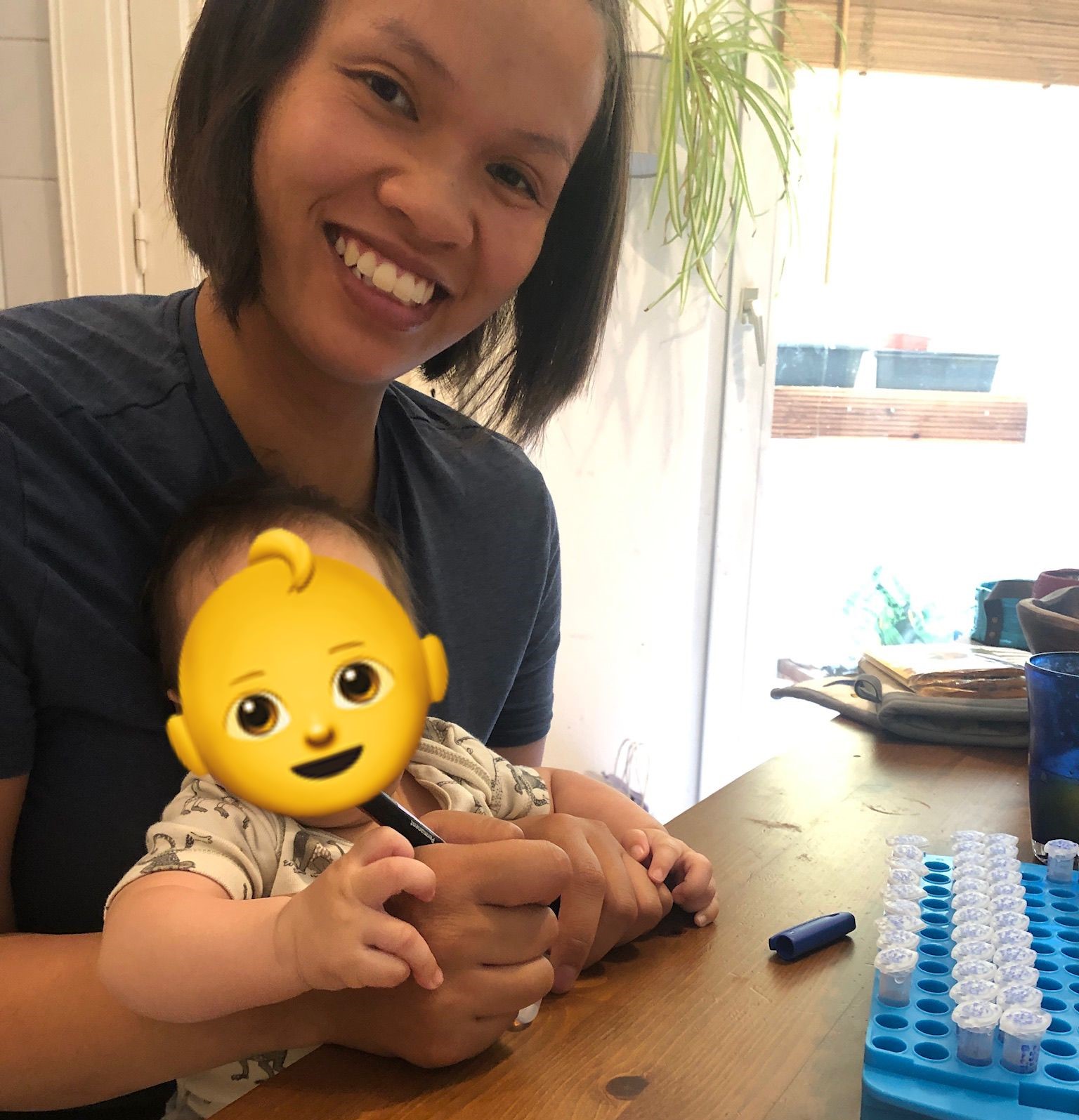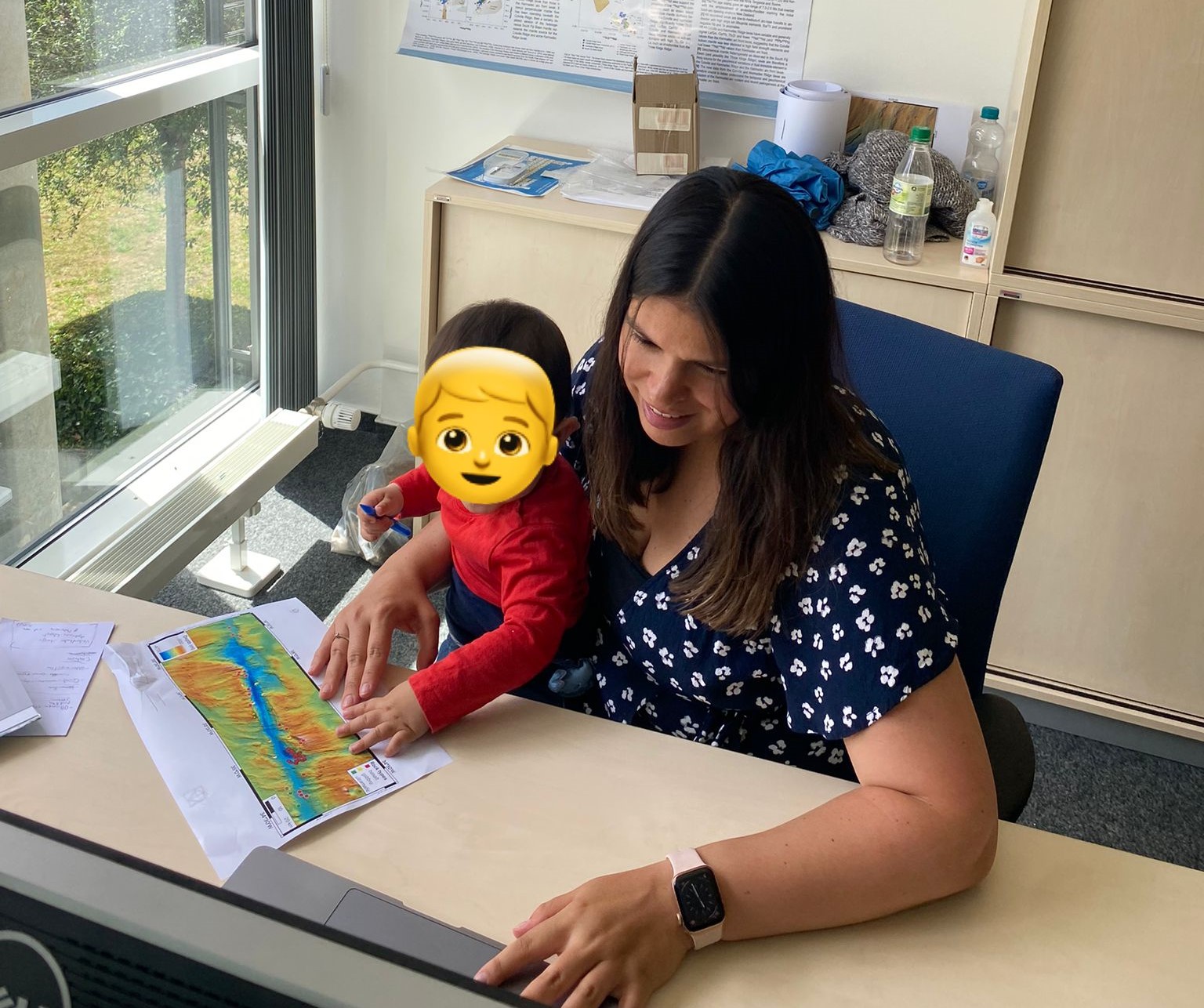Some people say family and a scientific career are not a good match, others say there is no better time to become a mother than during your PhD. Follow along as we, Katharina and Kim, share our journey of balancing motherhood and continuing our doctoral research project.
How it all began:
Katharina: Since I was little, I knew I wanted to be a mom someday. My boyfriend and I talked about it and decided there will never be a right moment in life where everything is perfectly aligned, so why not have a baby now?
I got pregnant during my 2nd year of my doctoral research project. I work in two different working groups: volcanology and seafloor modeling. My project is about gaining more knowledge on transform faults in the ocean. Therefore, I interpret bathymetrical maps and look at which rocks we find within transform faults.
Everyone at work as well as my family and friends were very supportive when they found out I was pregnant.
Kim: I was also in my second year of my doctoral research project. I am a marine evolutionary biologist at Kiel University and study the role of microbiota in pipefish – these small fish from the Baltic Sea where the males get pregnant. My work was all about (fish) pregnancy every day. Nevertheless, it was completely unexpected and surprising when I saw two lines on the pregnancy test. At that moment, my only thought was that I wasn’t prepared and felt like I couldn’t handle it right now. I knew I couldn’t go to the lab or take care of the fish anymore. I couldn’t do fieldwork or run the planned experiment for this year. My whole project had to be put on hold for a while. But what amazed me was the incredible support I received from my partner, family, friends, and supervisor. They reassured me that we would find a solution. Hearing those words gave me confidence that everything would work out in the end.
The pregnancy:
Katharina: During my pregnancy I had the baby in mind most of the time. I was so curious how he/she will be and how life with a baby will be. I can tell you, I never imagined it to be that challenging. In my mind the baby would sleep a lot and I would be able to work on my thesis.
I was lucky that I had a lot of energy during my pregnancy and felt well (at least after the nausea of the first months was gone). I worked in the office until 6 weeks before giving birth. The good thing is I work a lot on the computer so my working timeline was nearly not affected at all.
Kim: My pregnancy went really well; I felt healthy and active throughout the entire nine months. In the lab, we had to make some changes right away. Our lab technician took over my current tasks, and I shifted my focus to analyzing the data that had been piling up for a while. Since our working group had recently moved to Kiel University from GEOMAR, we were still getting used to the new procedures. Thankfully, we knew that the health insurance covers a substitute during pregnancy and maternity leave. After a few calls with the HR department, we were able to hire a former colleague to join us again and take over the work that I couldn’t do anymore. This turned out to be a fortunate situation because it gave me enough time to focus on my computer work without interrupting my lab and experimental tasks. I personally enjoyed this time. I attended a conference, organized a meeting with my thesis advisors, finally tackled the statistics for my first research paper, launched our Ocean Voices blog, and even participated in a first aid course with my colleagues a few weeks before giving birth. The initial days of my maternity leave made me miss being at work, but I was also excited about what was to come.
The maternity leave:
Katharina: In June 2022 my son was born. My boyfriend helped me a lot whenever he could and we became a good team taking care of the baby. I should mention that my boyfriend is still a student at university so he did not take any parental leave. It was helpful that his semester break started in the beginning of July, so he was at home for about 2,5 months. I would say 2 months after the baby was born we had a good routine and were also ready to travel around Germany and visit family.
Kim: My daughter arrived in April, and we had the entire summer ahead of us. My partner took a five-month parental leave, which was very helpful and supportive. We embarked on two road trips across Europe, visiting family and friends and most important: creating memories that I can truly say were once-in-a-lifetime experiences. During this time, I stayed in close contact with my colleagues, being always up to date on my experiments. However, the main focus was on getting to know each other, deepening our bond and enjoying the summer as a small family.

Back to work:
Katharina: I decided to go back to work after 4 months staying at home, so I started working 16h/week. My boyfriend took care of the baby whenever he had time during his studies. Looking back, I would say this was perfect because I still had enough time to spend with my son and was still able to push my thesis forward. When you become a parent, you manage your time more tightly because you know once you are at home your priorities change. On those days when my son was acting out, work felt like a small vacation. Now after over a year of giving birth I am still working 16h/week and it matches perfectly with the schedule of my boyfriend. Once a week I go to a mom-baby course, the kids play and the moms have time to communicate.
Kim: When my daughter turned nine months old, I started working again, taking on a part-time schedule of two days per week. During this period, my partner and I took turns caring for her. Before my maternity leave, I had imagined returning to work with a lot of energy and motivation, but I soon realized that it wasn’t as easy as I thought. Although I truly enjoyed working on my research project once again, rather than being a full-time mother, I had underestimated the challenges that came with it, in particular the sleepless nights and the constant thoughts that revolved around my baby: Is she sleeping well? Is she happy when I’m away all day?
When my daughter was almost 11 months old, we were fortunate to find a spot for her at daycare. Seeing her enjoy her time there was a great relief and support for both of us. At 13 months old, I made the decision to return to work full-time. Our days have become quite busy, commuting between home, daycare, and work, while trying to get as much done as possible in between. I am often exhausted in the evenings, but I have absolutely no regrets about the choices I’ve made.

Looking back:
Katharina: I never imagined it to be this challenging to raise a baby. But all the smiles, hugs and kisses that you get back are worth all the work. For me this was the perfect timing to have a baby and I feel very blessed.
Kim: Over the past two years, from the moment I discovered I was pregnant until my return to work with a one-year-old toddler, my journey has been filled with support, joy, and many happy moments. While it’s true that these times can be challenging, personally, I don’t see becoming a mother during my PhD as a negative experience. In fact, I consider being a scientist a big advantage because my work allows me to be flexible, and even work from home when needed.
Our advice to anyone who feels insecure about this topic: Ask for information, don’t be scared to get support and help! If it’s about your thesis, talk to your supervisor and colleagues. And if you have questions regarding family-friendly work conditions, financial support or child care there are many institutions that are here to support you, for example:
- Equal Opportunity Officers at GEOMAR: https://www.geomar.de/en/gleichstellung
- Family Service for employees of CAU: https://www.familienservice.uni-kiel.de/en?set_language=en
- Studentenwerk Kiel (for PhD students enrolled at CAU): https://studentenwerk.sh/en/family-overview
- Corrente counseling (for employees of GEOMAR and CAU)
- ProFamilia in Kiel: https://www.profamilia.de/angebote-vor-ort/schleswig-holstein/kiel
We hope that we could give you an insight into our lives as doctoral researchers and mothers. We wish all of you who are already pregnant or planning to become parents (soon) a good start into this new adventure!
Katharina & Kim
